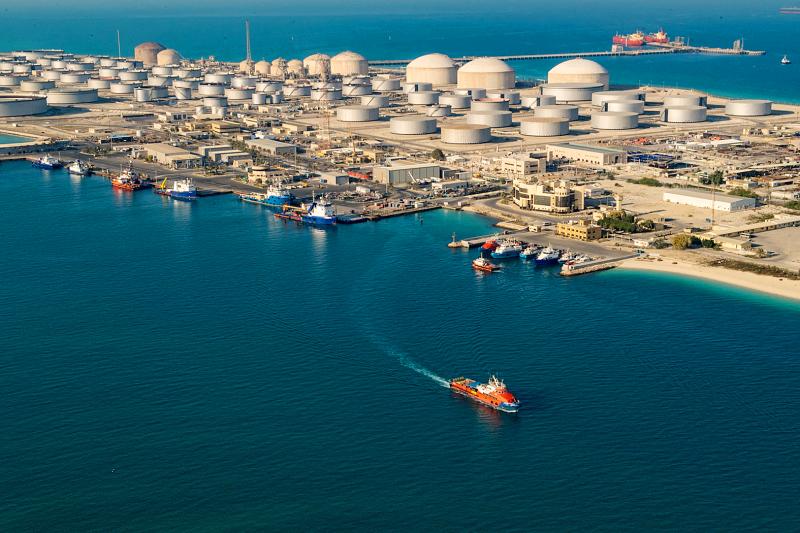OPEC and its allies have agreed to stick to their plan for gradual monthly oil production increases after a brief videoconference.
Ministers ratified the 400,000 barrel-a-day supply increase scheduled for next month after less than an hour of talks, one of the quickest meetings in recent memory and a stark contrast to drawn out negotiations in July.
While conditions might appear favorable for OPEC, there are uncertainties on the horizon. Even as demand recovers, it has been buffeted by the emergence of new SARS-CoV-2 variants. The question of whether Iran and the US will strike a deal to lift sanctions on the Islamic Republic’s oil exports — currently looking less likely — also hangs over the market.

Photo: AFP / HO / ARAMCO
West Texas Intermediate was 0.4 percent lower after closing little changed on Wednesday.
OPEC and its allies including Russia are in the process of rolling back the unprecedented output cuts implemented at the depths of the COVID-19 crisis last year.
About 45 percent of the idle supply has already been revived, and the group in July laid out a plan for gradually returning the remainder through September next year.
With crude prices mostly recovered from a slump in the middle of last month and the supply outlook relatively tight for the rest of the year, the 23-nation coalition had little reason to change the established schedule of gradual monthly supply increases, despite a request from the White House to revive output faster.
There had been some doubts about the plan when oil markets wobbled over the summer as the resurgent virus threatened demand.
However, fuel use proved resilient, with total oil products supplied in the US rising to a record late last month.
“While the effects of the Covid-19 pandemic continue to cast some uncertainty, market fundamentals have strengthened and OECD [Organisation for Economic Co-operation and Development] stocks continue to fall as the recovery accelerates,” OPEC+ said in a statement.
The group is to meet again on Oct. 4.
Data presented to ministers reveal a fresh challenge for Saudi Arabia and its partners next year.
Markets were projected to tip back into surplus next year, with an average oversupply of 1.6 million barrels a day.
However, the projections assume that the group would restore all of the almost 6 million barrels a day of output that remains offline — an unlikely feat as many countries might struggle to reach their full targets.
The amount of crude production that OPEC+ theoretically holds offline is based on questionable figures. Russia has an inflated baseline that is significantly higher than pre-COVID-19 pandemic output. Some other members have outdated capacity numbers, with countries including Angola and Nigeria already struggling to make the supply increases permitted under the deal.

Application-specific integrated circuit designer Faraday Technology Corp (智原) yesterday said that although revenue this quarter would decline 30 percent from last quarter, it retained its full-year forecast of revenue growth of 100 percent. The company attributed the quarterly drop to a slowdown in customers’ production of chips using Faraday’s advanced packaging technology. The company is still confident about its revenue growth this year, given its strong “design-win” — or the projects it won to help customers design their chips, Faraday president Steve Wang (王國雍) told an online earnings conference. “The design-win this year is better than we expected. We believe we will win

Intel Corp chief executive officer Lip-Bu Tan (陳立武) is expected to meet with Taiwanese suppliers next month in conjunction with the opening of the Computex Taipei trade show, supply chain sources said on Monday. The visit, the first for Tan to Taiwan since assuming his new post last month, would be aimed at enhancing Intel’s ties with suppliers in Taiwan as he attempts to help turn around the struggling US chipmaker, the sources said. Tan is to hold a banquet to celebrate Intel’s 40-year presence in Taiwan before Computex opens on May 20 and invite dozens of Taiwanese suppliers to exchange views

Chizuko Kimura has become the first female sushi chef in the world to win a Michelin star, fulfilling a promise she made to her dying husband to continue his legacy. The 54-year-old Japanese chef regained the Michelin star her late husband, Shunei Kimura, won three years ago for their Sushi Shunei restaurant in Paris. For Shunei Kimura, the star was a dream come true. However, the joy was short-lived. He died from cancer just three months later in June 2022. He was 65. The following year, the restaurant in the heart of Montmartre lost its star rating. Chizuko Kimura insisted that the new star is still down

While China’s leaders use their economic and political might to fight US President Donald Trump’s trade war “to the end,” its army of social media soldiers are embarking on a more humorous campaign online. Trump’s tariff blitz has seen Washington and Beijing impose eye-watering duties on imports from the other, fanning a standoff between the economic superpowers that has sparked global recession fears and sent markets into a tailspin. Trump says his policy is a response to years of being “ripped off” by other countries and aims to bring manufacturing to the US, forcing companies to employ US workers. However, China’s online warriors